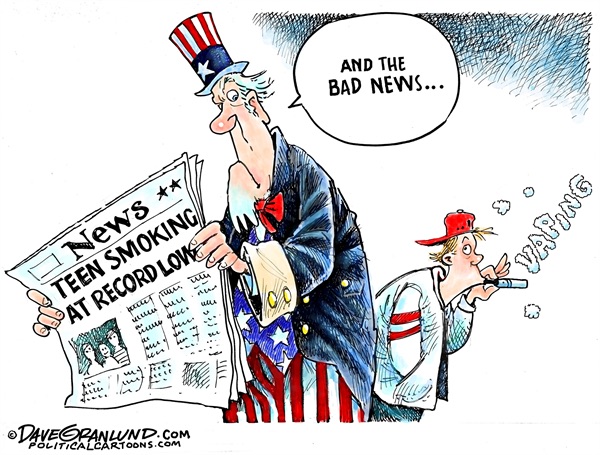Unhealthy by Any Measure
E-Cigarette Damage Extends to the Environment

We have probably all experienced seeing or even walking into a dramatic cloud exhaled by someone using an electronic cigarette or “vape” device, which have become very popular in recent years. In our local Santa Barbara County communities, over 23 percent of adults and 17 percent of high school students currently use these products, which doesn’t account for the large number of out of town visitors and tourists who bring their vapes with them (Cottage Center for Population Health, 2020). Exposure to these puffs of fumes is not the only danger associated with these products. If you look close enough at the ground, alongside the roadways, and in public trash bins, you will also start to see another result of their use: waste created by used cartridges and batteries. This kind of litter is not only unsightly, it creates an environmental hazard.
The waste generated by e-cigarette and vape devices is actually three types of waste: solid, hazardous, and electronic waste. The plastics associated with the packaging and the device components are considered solid waste. These plastics remain in our environment without breaking down when littered or disposed of with household trash. The “pods” or cartridges containing tobacco-related liquid are composed of highly toxic nicotine salts, which seep into the soil and groundwater system. The toxicity of these liquids make them a hazardous waste. The flammable lithium ion batteries are considered electronic waste and contain dangerous heavy metals such as mercury and lead, and have even been linked to explosions and fires. The unique composition of these devices makes them particularly harmful for the environment. In fact, discarded devices can cause contamination of soil and aquatic ecosystems. According to a recent study by the California Tobacco Control Program (2021), if one-third of the approximately 83,500 adult users in Santa Barbara County use only one pod or disposable device per day, they would generate more than 10 million pieces of waste each year. This is unnecessary waste that is frequently littered or disposed of with household trash and is environmentally unsafe.
Reducing the use of e-cigarettes and vapes is a key intervention not only for the health of the individual user, but also in reducing the amount of its associated waste in our community. A survey of local retailers revealed that 89 percent of stores in Santa Barbara County sell flavored tobacco products while only 43 percent of those stores sell fresh fruits and vegetables (Healthy Stores for a Healthy Community, 2021). A ban on the sale of flavored tobacco reduces the overall market for these products, protecting our youth, community members, and our environment. These types of restrictions have popular public support, with 54 percent of respondents in a national US survey stating that fruit and candy flavored e-cigarettes should be banned by the FDA (Public Health and Tobacco Policy Center, 2019). Over the last two years, Santa Cruz County and several of its incorporated localities have successfully passed ordinances prohibiting the sale and distribution of flavored tobacco to reduce environmental damage. The city of Watsonville took this one step further, banning the sale of all electronic cigarette products. Much like plastic straw bans, these local ordinances protect the environment by reducing waste associated with flavored tobacco products and e-cigarettes.
The Goleta City Council is currently considering an ordinance that would ban the sale of flavored tobacco products within city limits. This type of ban would reduce local use, especially among our vulnerable youth. Visitors and tourists would be unable to purchase these items and their use while in our community would be limited as well. In turn, this ordinance would result in the reduction of the amount of e-cigarette and vape waste in our environment.
As a concerned group of Master of Public Health students, we are joining local agencies including the Coalition Engaged in a Smokefree Effort (CEASE) and Future Leaders of America (FLA) to urge community members to support the proposed Goleta ban on the sale of flavored tobacco products. Residents of Goleta can contact the City Council to express their endorsement of the proposal by visiting the city’s website (www.cityofgoleta.org) and emailing members individually. Those not living within Goleta can contact their own representatives to start the conversation regarding similar proposals in their own communities. Banning flavored tobacco products is a significant step in protecting individual, community, and environmental health.
Melissa Wilkins is a long-time resident of the City of Goleta, and Vanessa Aguilera-Viorato, Emily Bowen, Michelle Huynh, Ogechukwu Ogamba, Shannon Shimada, Carin Watts, and Melissa Wilkins are Master of Public Health students at San José State University.



